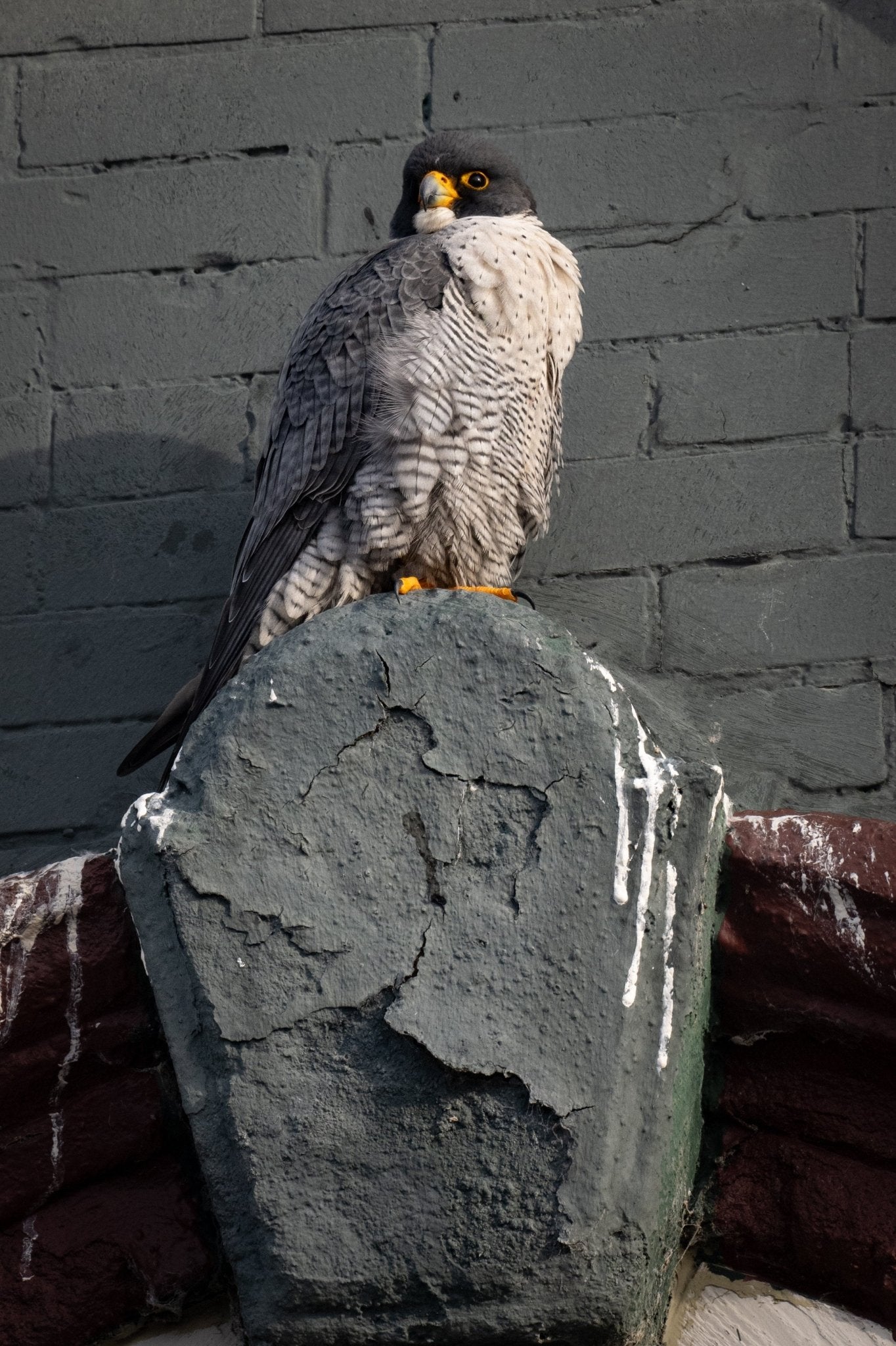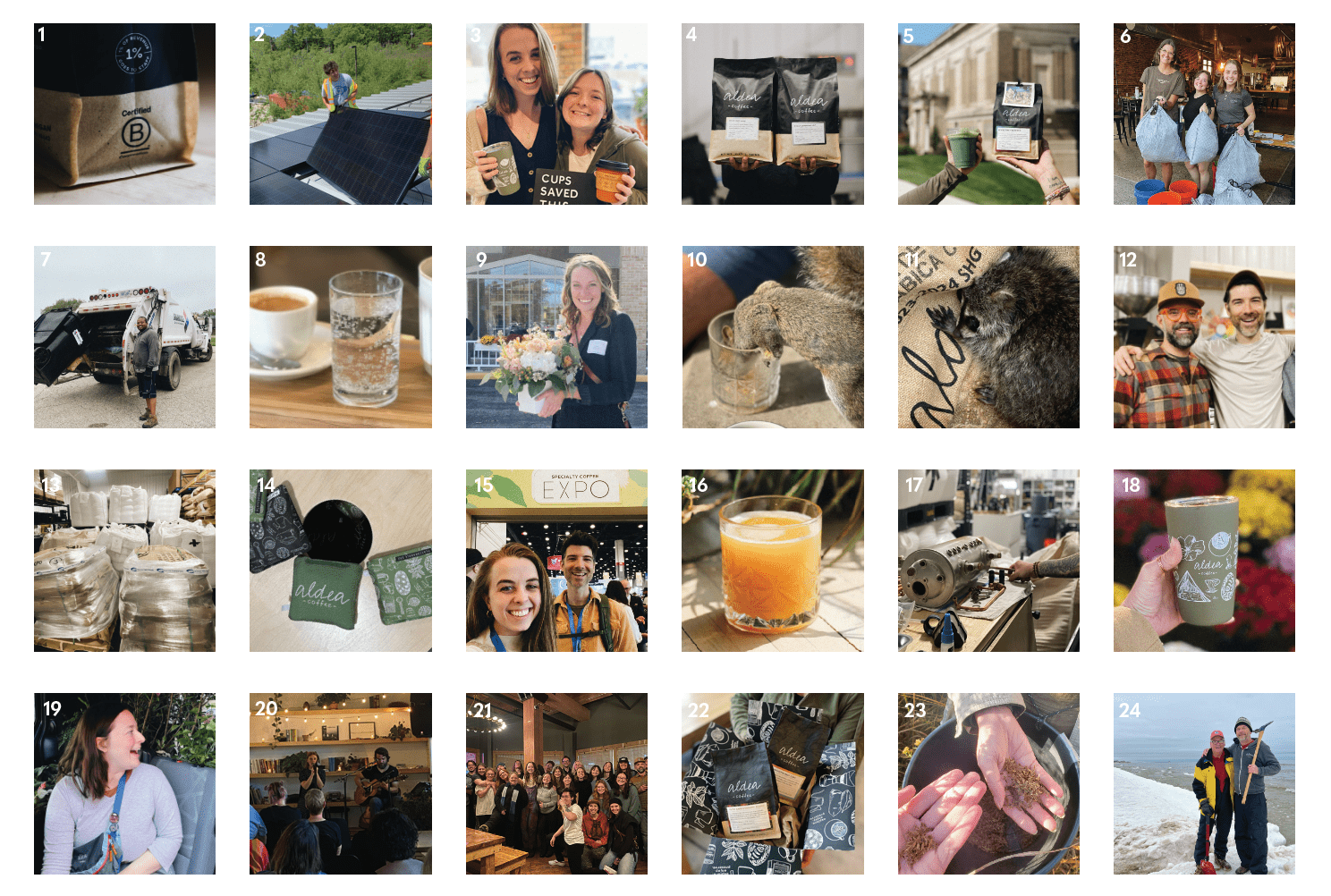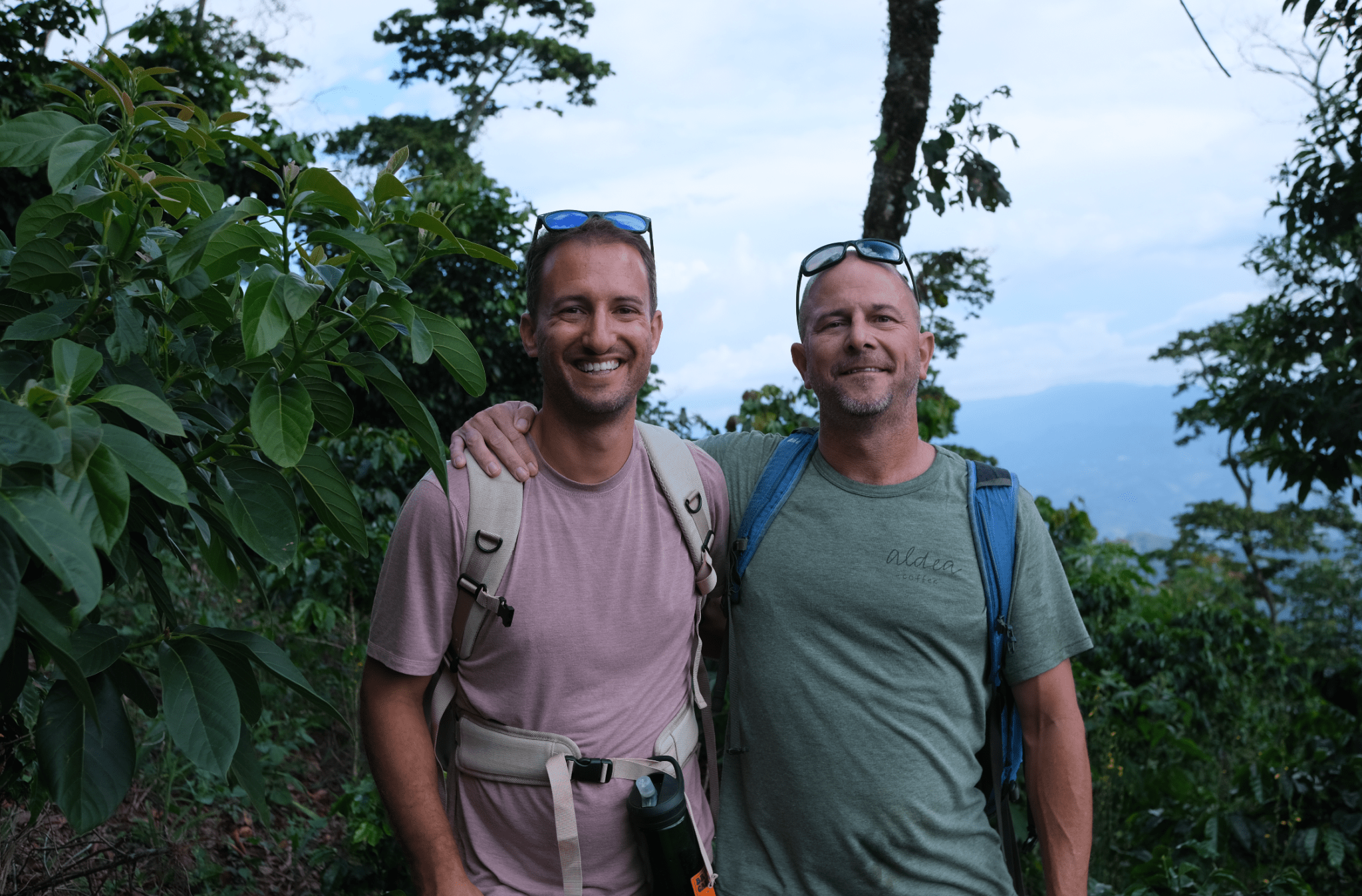Overview
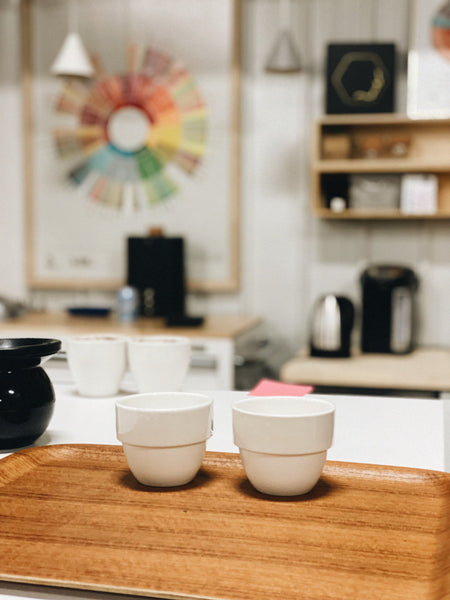
Monthly Features
Filter (Drip)
Washed process light roast with notes of strawberry, chamomile and almonds.
Washed process medium roast with notes of hazelnut, black cherry, and chocolate.
Small batch imported by Aldea from Mbeya, TZ. Dark roast with notes of baker’s chocolate and a pleasant floral quality.
Pourover
- Ramon Enamardo
Natural processed dark roast from Honduras with notes of dark chocolate and dried berries.
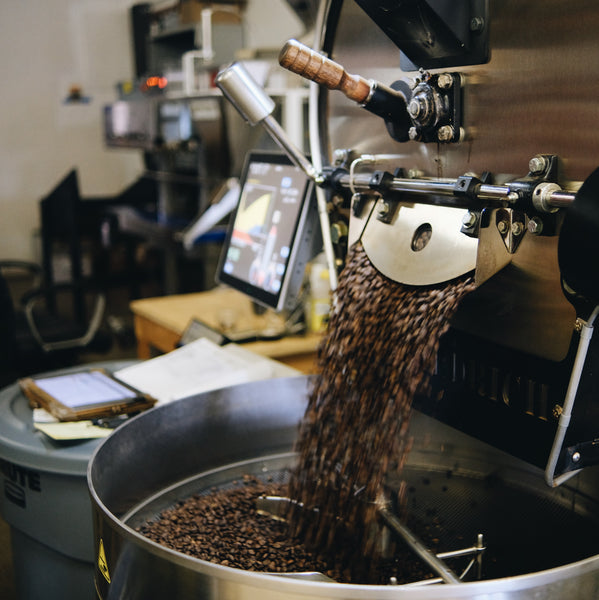
Coffee Fun Fact
What has more caffeine: Light or dark roasts?
Light and dark roasts have the same amount of caffeine, bean for bean. Roasting doesn’t really “burn off” caffeine. So the crux of the argument is more a matter of how you measure your coffee. You see, the longer/hotter and therefore darker you roast coffee, the more a coffee loses mass and grows in size. So, if you measure your coffee with a scale, then a darker roasted brew will have more caffeine because you will need more dark beans to measure a gram vs. light beans of the same variety. A lightly roasted bean is often denser and smaller than a dark roast. So, if you measure your brew dose with a scoop, you will need more lightly roasted beans to fit the scoop space vs. a darker roast, giving you more caffeine in such a brew. Shout out to my HS physics teacher for the density vs. mass lesson.
REFLECTIONS FROM THE ROASTERY
Wow, January in Michigan was CLOUDY. Very. According to the National Weather Service in Grand Rapids, January 2024 was Michigan’s “second cloudiest January on record,” with only 8% of a possible 290 sunshine hours reported (about an average of 45 mins daily).* I definitely felt it. But you know what I can feel now? The sun. Yup. 50 degrees and the cardinals are singing. February already feels like progress.
Coffee harvest season is nearing a close down in Lempira, Honduras, where more than 80% of our green coffee comes from (Side note, if you’re unfamiliar: before coffee beans are roasted, they are actually green, rock-hard, and smell more like hay/alfalfa or fruity like apples. Hence the term green coffee.). Some of our team members are heading down there this month to visit the coffee producers we partner with every year and see the process firsthand. I promise to tell you about their adventure in next month’s newsletter. Stay tuned.
In other news, Andrew has spruced up our cupping area at the warehouse (aka coffee tasting area. Love it. Looking beautiful. Thanks, Andrew!) and we are already making plans for the summer. With a new blend coming out towards the end of May and a new drink special at the cafes, there’s much to look forward to. Our next shipment of Tanzanian AA green coffee will be arriving in the next couple of months and our awesome E.A. Decaf will be arriving from Colombia in the next couple of weeks. New arrivals are always an exciting time as a roaster. I tasted these coffees a couple of months ago before they left port for America, and I get to try them again in all their glory when they arrive in their 130-150 pound sacks. Feels a bit like a friend coming home.
*Torresgrassa, Mark. “The sunshine amount for January has been tallied, and it was bad.” MLIVE. 2 February 2024.

RUNOUTS & RELEASES
Our retail lineup will remain the same until March. However, we will have a couple of exciting releases coming your way next month. Stay tuned.
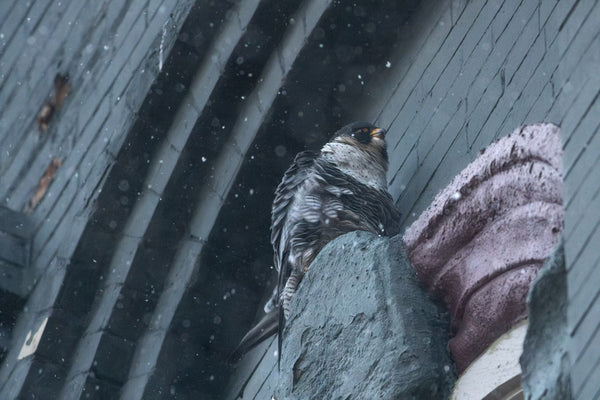
THE FALCON ABOVE THE WINDOW: THE JACKIE POLLOCK STORY
By Scott Dorsch
It began with bird droppings. Everywhere.
Splotches on the sidewalks. White rivulets streamed down the grout, brickwork, charcoal eaves, and red lintels above the Aldea Coffee café in Grand Haven. It seemed the 117 Building was under siege.
The staff were diligent in keeping the sidewalks and reachable areas of the wall scrubbed clean. The duty (no pun intended) was added to the daily chores list in the summer of 2023.
“For the longest time, we thought it was the sparrows or something,” says Andrew Boyd, co-founder of Aldea Coffee. “But it was sometime this summer that we noticed there [were] more [droppings] than usual.”
Everyone thought it was the house sparrows that used to nest in the columns outside the building. However, according to Boyd, these nest sites were filled with steel wool by the building manager earlier that year to discourage the bird’s potentially harmful nesting behavior.
“It turns out it was her all along,” says Boyd. “We call her Jackie Pollock.”
About twenty feet up on the south side of the building, a female peregrine falcon was spotted perching on the lintel of a window by Grand Haven resident and Aldea regular, Jane Yoshonis, in the late summer of 2023. Named after the abstract painter, Jackson Pollock, and specifically for his famous “drip technique,” Jackie the crow-sized falcon camouflages perfectly with the 117 Building with her gray back, dark head and sideburns, and barred chest, which is likely why she remained unnoticed for so long.
Due to loss of habitat and opportunism, peregrine falcons (Falco peregrinus) have been moving into cityscapes across America for decades, trading cliffs and tall trees for towers and skyscrapers and feeding on urban small game like rock doves (pigeons). Despite being one of the most widespread raptors on Earth due to their great ability to adapt and travel long distances (hence its Latin namesake peregrinus or “wanderer”) they are a relatively rare sighting and remain “threatened” on Michigan’s endangered species list.
With their population reaching a “critical low” in 1960, “conservation and legislative efforts have allowed these birds to recover,” according to the Michigan Audubon Society. Although the extensive use of the pesticide DTT was banned in the 70s, benefitting all wildlife including peregrines, other factors such as habitat loss, rodenticides (mouse and rat poison), and illegal killings continue to threaten the species nationally and statewide.
In his January 2022 article in The Grand Haven Tribune, “Peregrine Falcons Looking for New Nesting Spot,” Matthew Ehler reports on the displacement of Grand Haven peregrines following the deconstruction of the Board of Light & Power J.B. Sims smokestack in 2021.
“The majestic birds called the smokestack home for more than 20 years, . . .but they just haven’t found a suitable nesting spot yet [since the smokestack came down],” says Ehler. At the time of the article, there were peregrine sightings at St. John’s Lutheran Church in Grand Haven, but state wildlife experts said it would “take some time” for the falcons to find a home. According to Department of Natural Resources wildlife biologist Nick Kalejs, “Even with the smokestack at BLP, it was five years for any kind of falcon activity.”
Despite the timeline presented by Kalejs, it seems there is at least one peregrine who found a home in Grand Haven, and we are excited to say that it is right above our café.
Next time you stop in, be sure to tip your glass to Jackie (and mind your head).
Tips and Takeaways
The discovery of our resident peregrine is more than awesome. Her presence in downtown Grand Haven is also a great reminder that the separation between us and nature is nonexistent. I think I take for granted at times all the wildlife that is present (even if unseen) and is affected by my actions on a daily basis. Our homes, our buildings, our vehicles, and our decisions (what we buy, what we use on our lawns, what we eat, etc.), can all be beneficial or harmful to our human and nonhuman neighbors. We exist together.
With that in mind, here are some tips to help keep beautiful things like Jackie around:
- Avoid the use of pesticides (including rodenticides) in your home and garden. Use OMRI Certified (Organic Materials Review Institute) insecticides or detergents whenever possible.
- As larger animals ingest poisoned rodents and insects or inhale or touch recent pesticide applications, it can “bioaccumulate” and harm birds especially due to a reduced activity of metabolic enzymes in their digestive tracts as compared to mammals.
- Take part in a local bird count event with organizations like your local Audubon chapter to help in the effort of monitoring bird populations.
- If group events aren’t your thing, you can register your daily bird observations on Cornell Lab of Ornithology’s app, eBird (ebird.org). This is another great way to be a citizen scientist and help keep track of local bird populations and migratory patterns.
- And lastly, as a daily practice, go in and out of your home, work, vehicles, and woods as quietly as possible. Yes, the slamming of doors and loud music, say, does affect wildlife. These sudden loud noises cause birds and other wildlife to flee and expend hard-earned energy. This could be detrimental in the late winter/early spring and the evening, generally.
Fun Peregrine Falcon Facts
- Known for their blazing dive speeds of up to 240 miles per hour, they are the fastest animals on the planet. Sorry, cheetahs.
- Female peregrines are about 1/3 larger than males (This is true for all raptors, including bald eagles.).
- Male peregrines are known as tiercels. Whereas females are actually known as falcons.
- Peregrines have a 41-inch wingspan on average, which is about the length of a guitar.
References
Ehler, Matthew. “Peregrine falcons looking for new nesting spot.” The Grand Haven Tribune, 15 January 2022. Updated 21 February 2022. https://www.grandhaventribune.com/news/environment/peregrine-falcons-looking-for-new-nesting-spot/article_df699d31-9bf4-5659-aac5-40f0fac0b5c0.html.
Good, Heather. “Peregrine Falcons in Michigan.” Michiganaudobon.org. Michigan Audubon Society, 1 February 2022. https://www.michiganaudubon.org/peregrine-falcons-in-michigan/.
Root, Stephanie. “The Falcon and the Tiercel.” Nps.gov. National Parks Service, 31 January 2018. https://www.nps.gov/cabr/blogs/the-falcon-and-the-tiercel.htm.
